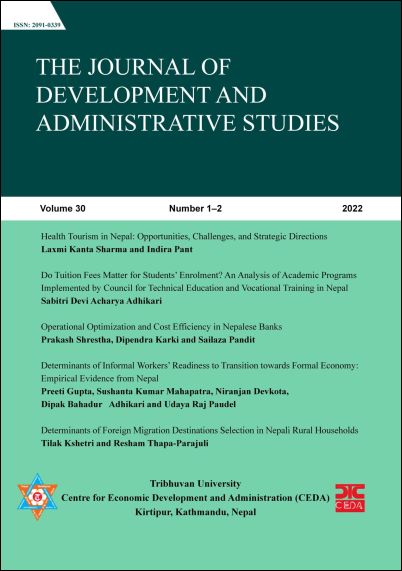Health Tourism in Nepal: Opportunities, Challenges, and Strategic Directions
DOI:
https://doi.org/10.3126/jodas.v30i1-2.69520Keywords:
Health tourism, Wellness tourism, Strategic directions, Traditional healing, Healthcare infrastructureAbstract
This study examines the current state of health tourism in Nepal, focusing on evaluating the sector's strengths, opportunities, and challenges, and proposing strategic directions for enhancing its competitiveness. Nepal's unique position as a potential leader in health tourism is highlighted, due to its rich cultural heritage, diverse natural landscapes, and traditional healing practices such as Ayurveda and yoga. To achieve the study's objectives, a comprehensive qualitative research design was employed, utilizing key stakeholder interviews, focus groups, and document analysis to gather data from a diverse range of participants. Stakeholders included health tourists, hospital representatives, and wellness service providers across major cities like Kathmandu, Pokhara, Bharatpur, and Lumbini. The analysis reveals Nepal's strengths in providing affordable healthcare services and integrating modern medical treatments with traditional wellness practices. However, significant challenges persist, including inadequate infrastructure, fragmented marketing efforts, and inconsistent regulatory standards. The findings emphasize the necessity for strategic improvements, highlighting Nepal's potential to become a premier destination for health tourism. The study recommends strategic initiatives, including investment in healthcare infrastructure, the development of cohesive marketing strategies, fostering collaborations between medical and wellness providers, and establishing robust regulatory frameworks to ensure quality and safety. By addressing these challenges and capitalizing on its unique offerings, Nepal can strengthen its position as a leading destination for health tourists seeking comprehensive and transformative healthcare experiences. This research offers actionable insights for policymakers, healthcare providers, and industry stakeholders, aiming to drive sustainable economic growth through strategic enhancements in Nepal's health tourism sector.
Downloads
Downloads
Published
How to Cite
Issue
Section
License
The copyright of the accepted articles is reserved by the Centre for Economic Development and Administration (CEDA), Tribhuvan University (TU). No part of the article published in this journal should be reproduced except provided by the law currently in force without the written consent of the centre.




